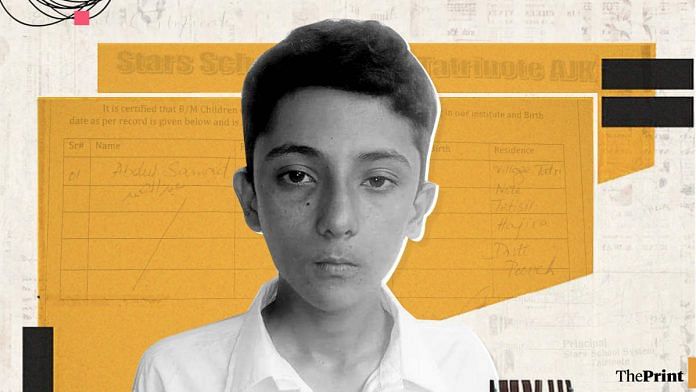New Delhi: The family of a Pakistani teenager who was arrested in November after accidentally crossing the Line of Control (LoC) near Poonch has appealed to India’s Prime Minister Narendra Modi for the schoolchild’s release, in an exclusive interview to ThePrint.
Fourteen-year-old Asmad Ali, his family says, strayed on to the Indian side of the LoC while playing with his pet pigeons.
“Asmad was very fond of his pet pigeons,” his maternal uncle, Arbab Ali, said. “He’d set them loose to fly that day, and ran behind them when they flew towards the Indian side. He is just a small child, and didn’t realise he was crossing the Line of Control.”
The boundary wall of the family’s home, in the village of Tatrinote, is just a few metres from the LoC, close to the famous Chakan-da-Bagh crossing point.
“The whole family is terribly upset,” Arbab Ali said. “Asmad’s grandmother, who brought him up, is in tears the whole day. His grandfather also cries all the time. We have no connection to any political group or organisation. Through this message, I appeal to India’s Prime Minister, in the spirit of humanity, for the child to be sent back to us.”
Also Read: Behind teen’s ‘abduction’ on LAC in Arunachal, a legacy of colonial maps, empires and wars
No security-related offence mentioned in FIR
Police documents accessed by ThePrint record that the teenager was held by a patrol of the 3rd Gorkha Regiment on 28 November last year. The teenager, an Army source said, was found on the Indian side of the Line of Control, ahead of the barbed-wire fencing designed to guard against infiltrating terrorists.
Following his detention, the Army handed over the teenager to the Jammu and Kashmir Police, which registered a First Information Report citing violation of the Egress and Internal Movement Control Ordinance. The law provides for a maximum sentence of up to two years in prison. Asmad was then produced before the Juvenile Justice Board in Poonch, and is now at a home for juvenile offenders in Ranbir Singh Pora.
The FIR does not mention any security-related offence, suggesting that neither the Army nor the police suspect that his crossing the LoC was related to terrorism. The Jammu and Kashmir Police did not respond to a request for comment.
A police officer familiar with the case said that “in normal circumstances, we’d have just let him go, as we have often done with children”. However, in this case, the officer explained, “there was some initial suspicion that this boy might have crossed the Line of Control earlier, too, which needed to be cleared up”.
An eighth-grade student at the Stars School in Tatrinote, Asmad was brought up by his maternal grandparents, Muhammad Aslam and Khadija, after the death of his mother. His father, Banaras Ali, remarried in Lahore, and Asmad found the new family milieu unwelcoming, a family source said.
The family’s circumstances had, however, become more straitened after his grandfather was forced to give up working as a labourer because of an injury. The responsibility of caring for the family fell on his uncle, who drives a rented taxi in Lahore.
Lieutenant General D.S. Hooda (retd), who earlier headed India’s Northern Army Command, told ThePrint that “the Indian Army has a tradition of being big-hearted in cases involving innocent civilians, especially women and children”.
“I’m sure generosity will continue to be shown in all cases where there are no security implications,” he added.
Children sent home earlier
The Indian government has often dropped charges in cases involving children who accidentally crossed the Line of Control, and returned them to their families. In December, 2020, for example, the government sent home 17-year-old Laiba Zubair and her 13-year-old sister Sana Zubair after they crossed the LoC along the Rangar nullah (stream) near Tattapani in Poonch.
A senior police official involved with the investigation of that case said the two girls, the daughters of a one-time jihadist who fled to Pakistan-occupied Jammu and Kashmir in the early 1990s, were hoping to re-establish contact with their ancestral family.
“The girls had been reduced to working as domestic labourers after their father passed away,” the officer said, “and thought that if they make it across the Line of Control, they will at least find a home willing to take them in.”
In 2017, two teenagers wrongly accused of being guides for the Lashkar-e-Taiba terrorists who attacked an Indian Army camp in Uri were returned home, after they were cleared by the National Investigation Agency.
(Edited by Asavari Singh)
Also Read: Split by Partition, met in 2022: Story of brothers’ reunion that’s making India-Pakistan cry



